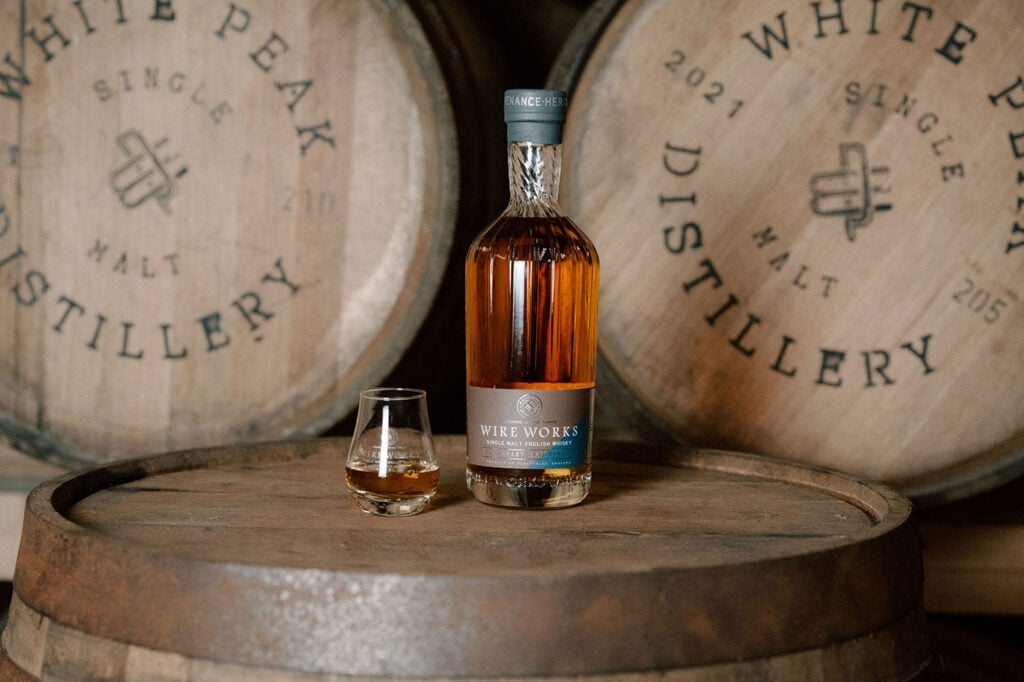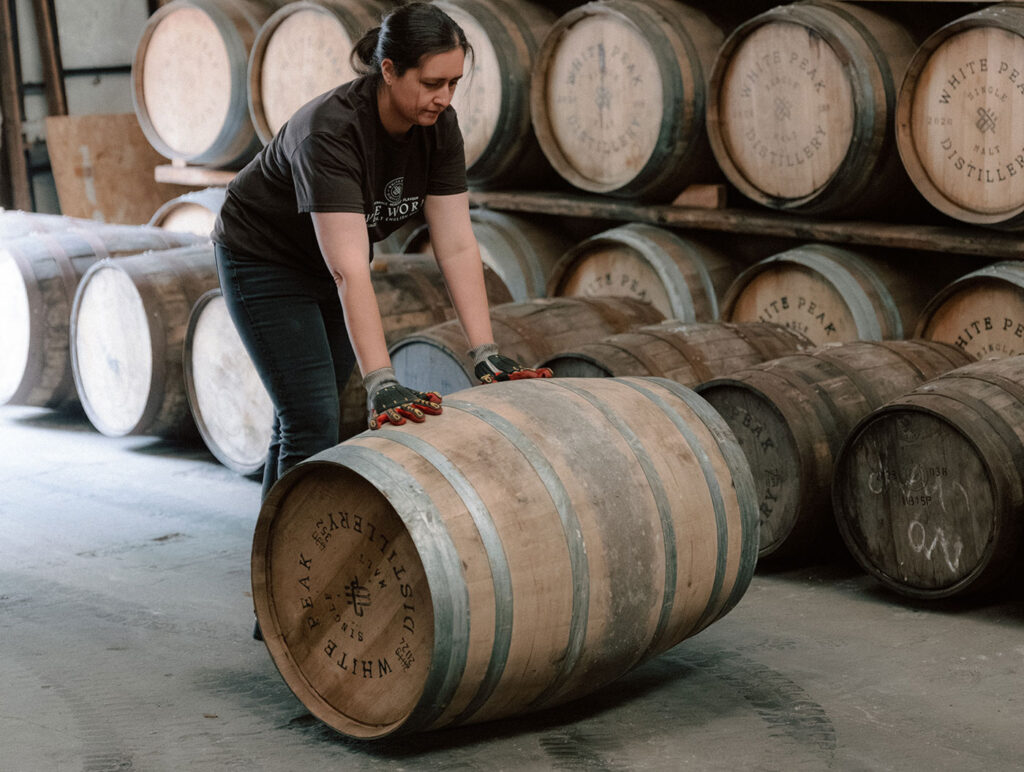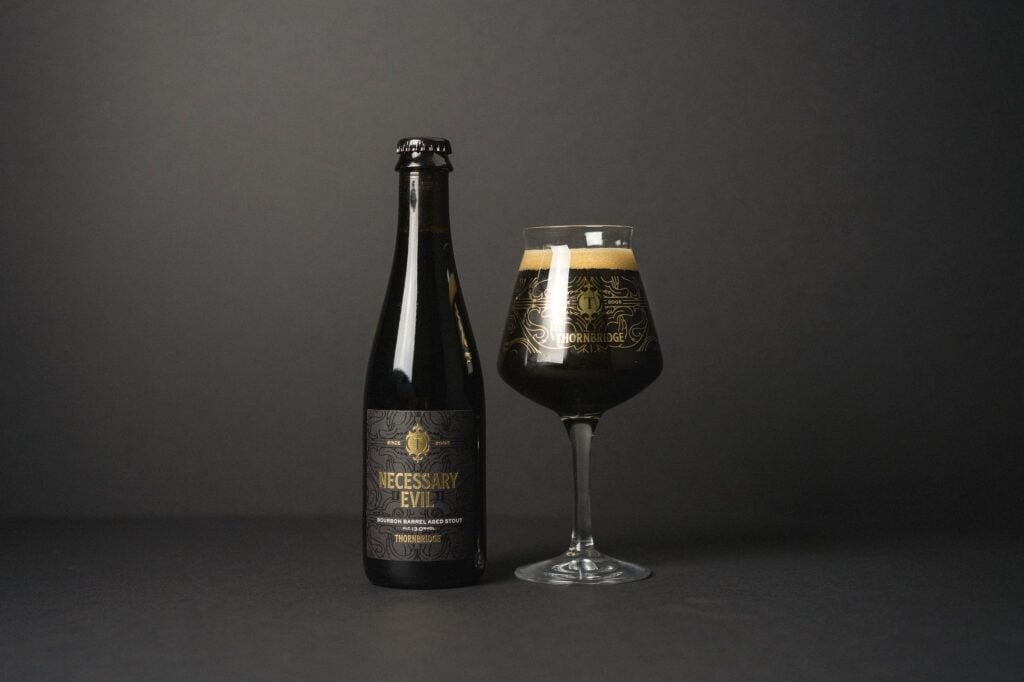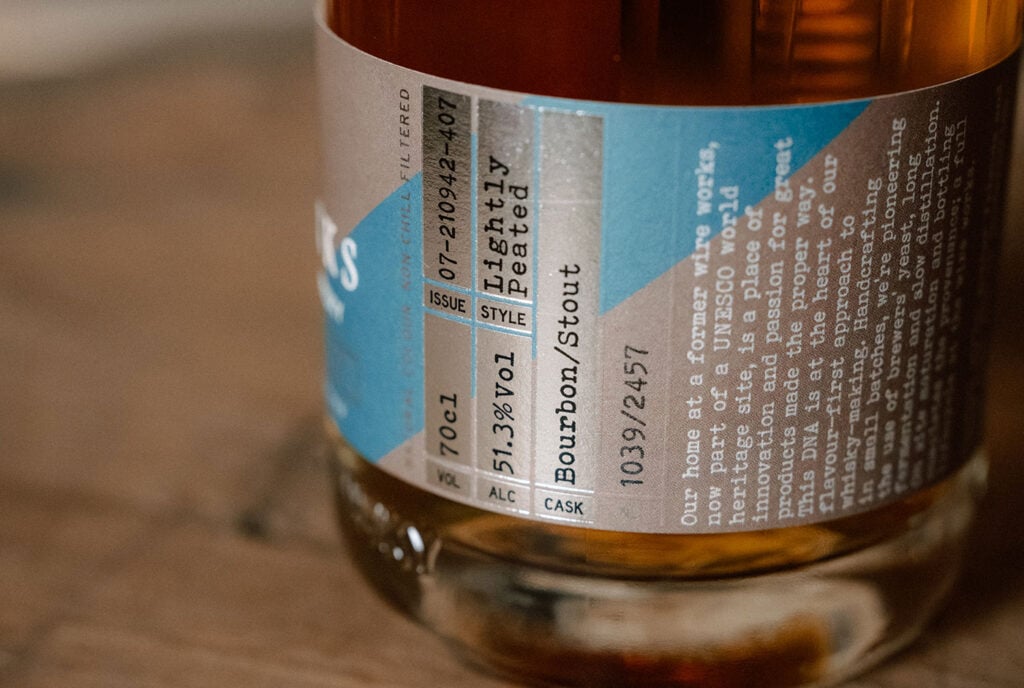In our Glencarin glass today is the third iteration of White Peak’s limited-edition: Wire Works Necessary Evil Finish.
The independent Derbyshire distillery has gained plaudits for its uncompromising approach to whisky making, a process we caught on film. You can see how place and heritage are represented in each whisky, without compromising flavour. From using English (and Derbyshire) barley to developing a bespoke live yeast blend inspired by the region’s brewing heritage, the integrity that guides the production is reflected in the spirit it makes.
The Necessary Evil Finish series is as good an example of that as any. It practically begs for a feature exploring this brewing-distilling ecosystem.
So, let’s explore the circle of flavour between brewing and whisky with Wire Works. Joining us is Claire Vaughan, co-founder of the White Peak Distillery.

Wire Works Necessary Evil Finish Batch 3 is our focus for today
Wire Works Necessary Evil Finish Batch 3 arrives
The English whisky starts life as White Peak’s lightly-peated spirit, which is matured initially in bourbon barrels.
It’s then finished in STR (ex-red wine, shaved, toasted and recharred) finishing casks began life with Wire Works whisky, went on to mature Necessary Evil stout. Thornbridge’s celebrated imperial stout is the winner of the World Beer Awards 2024 World’s Best Flavoured Beer.
Since 2022, the distillery has released two previous sell-out editions of Necessary Evil Finish. This year’s release, bottled again at 51.3% ABV, is an evolution of the previous releases.
Vaughan credits its success to flavour, friendship and a shared commitment to quality. It also reminds us of the importance of brewing in the whisky-making process.
The brewing of whisky
There’s growing recognition of this, Vaughan says, but she feels like it’s a fairly recent part of the whisky conversation and not one that they heard much talk of when they were starting out.
“The end products of beer and whisky are quite different, but dig a bit deeper and the brewing stages of whisky-making are central to how we think about flavour. Aside from the malt itself, the character of our spirit is heavily influenced by mashing and fermentation choices – equipment design, yeast, wort clarity, temperature, time – all of which come from a brewing mindset”.
She adds that this has been a big part of what’s made working with Thornbridge so natural, and all from a region in Derbyshire that is known for its brewing heritage.

White Peak founders Max and Claire Vaughan
The Thornbridge Brewery connection
Beyond Necessary Evil, the distillery collects spent brewer’s yeast from Thornbridge Brewery every week.
“The Thornbridge yeast contributes towards the fruit-forward, ester-rich profile in our spirit, think stone fruit, orchard fruit, sometimes even tropical notes,” Vaughan. “And it also supports a longer, slower fermentation, which we believe builds greater complexity in the final spirit. Compared to dry distillers’ yeast, spent brewers’ yeast is less efficient at creating alcohol, but for us, making whisky is all about flavour.
It’s that last sentence that shows you what is making the difference here. The Necessary Evil cask finish is the natural extension of that philosophy, the development of a circular flavour economy.
Collaboration with like-minded people
“For the 1st edition of Necessary Evil Finish in 2022, it was a bit more experimental, getting an understanding of how our spirit would develop in stout barrels. For this 3rd edition, we saw the potential in the STR casks having a life beyond their 2019 first fill with our spirit,” Vaughan explains.
“Sending them to Thornbridge for a subsequent use for barrel-aged Necessary Evil Stout, then bringing them back for a final finish with our whisky felt like the perfect way to explore a circular, flavour-driven Derbyshire journey”.
This relationship is characterised by Vaughan as authentic, collaborative, and creative, with each party benefiting. When you’re working with like-minded people, when interests converge, you don’t need a blueprint. The work develops naturally.
“We’re dealing with founders/people who have worked in independent businesses for many years, and to an extent, nothing is ever a grand plan, usually one that evolves over time and is shaped by the people involved”.

Casks of Necessary Evil at White Peak Distillery
The creativity in the casks
There’s so much focus at White Peak on the stages of whisky production that occur before distillation and maturation. But that doesn’t mean each isn’t given its required respect or focus. You can see that in the copper pot stills, hand-built to the founder’s designs, or the process of leaving headspace in the cask to encourage subtle oxidation.
“We’ve been using the technique selectively for some time now, so it’s a calculated decision rather than pure experiment (albeit one with variation in outcome),” Vaughan explains.
“We knew from winemaking and brewing that gentle oxidation can unlock certain flavours and soften edges. Leaving headspace in refill casks is a conscious decision to allow a touch more air interaction over time, which, in this case, we believed could also enhance the integration of the stout character with the whisky. We didn’t want the beer influence to dominate. We were aiming for balance, and this was one of the levers we pulled to help achieve that”.

Necessary Evil from Thornbridge Brewery
Not your average stout cask finish
The Necessary Evil barrels have now been through a cycle of red wine, whisky, stout, and back to whisky. Vaughan says they’ve had a seriously hard-working life, and there may still be potential for another round. Though that would likely be a lighter touch. Like a short secondary finish where subtlety is key.
“At this stage, they’re less about active extraction and more about gentle influence and oxidation dynamics. We’ll assess each cask individually and see what makes sense. There’s also the opportunity to refurbish or for re-use outside of whisky/beer,” Vaughan summarises.
In terms of style, the Necessary Evil range hasn’t been about creating a typical ‘sweet stout cask finish’. You can see that in this year’s release, which Vaughan reveals leans into balance and complexity brought about through the layering of flavour across cask uses.
“It’s not a sugar bomb – you’re not getting syrupy sweetness or overly roasted notes. Instead, there’s a more refined interplay of dark chocolate, toasted oak, and subtle coffee bitterness with our house fruit-forward spirit. There’s a dryness and structure to the whisky, and while the beer character is present, it’s integrated rather than dominant. We think this sets it apart from more indulgent cask finishes”.

Wire Works Necessary Evil Finish Batch 3 is now available from Master of Malt
A circle of flavour
I ask Vaughan if she had to describe Necessary Evil Finish as a person walking into a pub, who they are, and what they are ordering.
“They’re the one who knows the bartender’s name, orders a well-made/well-cellared beer with confidence (and probably brought a bottle of something rare to share later). Considered and never loud, but when they speak, people are interested”.
At the core of all of this is Derby. You can’t imagine this collaboration having the same impact if the other partner weren’t just down the road.
“The local aspect is paramount,” Vaughan says. “The proximity of our independent businesses means we’re sharing ideas, yeast, and casks with minimal red tape or transport impact. That immediacy helps keep everything fresh – literally and creatively and it also reflects our values as a distillery. This collaboration wouldn’t have the same depth if it weren’t rooted in shared geography and community. That’s not to say that remote collaborations can’t work, but the people and place are key to Necessary Evil Finish”.
You can buy Wire Works Necessary Evil Finish from Master of Malt.
